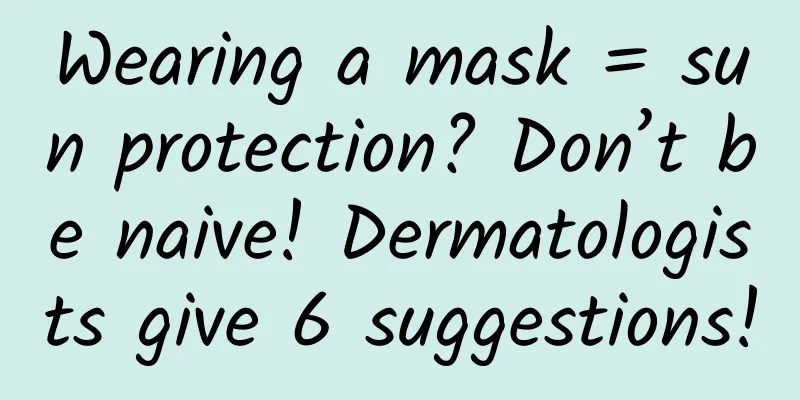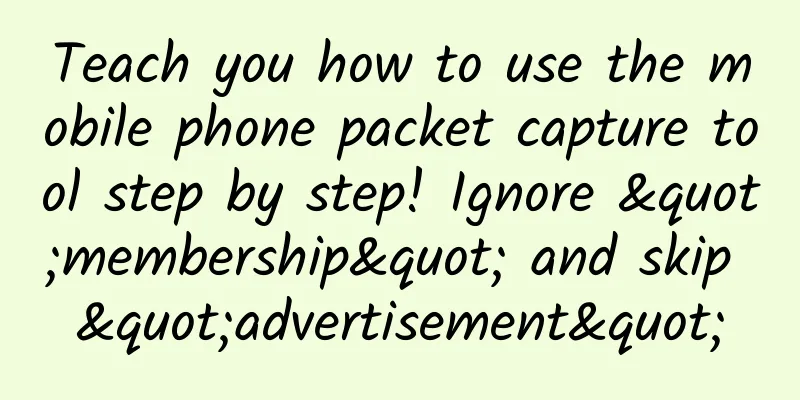Wearing a mask = sun protection? Don’t be naive! Dermatologists give 6 suggestions!

|
How high is the temperature in Guangzhou recently? It’s only the fourth day of May, and the high temperature warning signal has come! Many readers have asked: "Now I wear a mask every day when I go out, do I still need sun protection?" Of course I do! Masks cannot completely block ultraviolet rays. The sun can make us: red, tan, old, and even cause cancer... So how should we protect ourselves from the sun? Let's see what the experts at the Southern Medical University Dermatology Hospital say. The harm of ultraviolet rays The harmful rays from sunlight that reach the earth are UVA and UVB. Excessive exposure to either can cause skin cancer. In addition to causing skin cancer, these rays also have the following hazards: UVA rays (or aging rays) can prematurely age the skin, causing wrinkles and age spots, and can pass through glass windows. UVB rays (or sunburn rays), the main cause of sunburn, are blocked by window glass. How to choose sunscreen? As long as the sunscreen meets the three conditions of broad-spectrum protection (protecting against both UVA and UVB rays), SPF30, and strong water resistance, it can basically protect your skin from sunburn and prevent premature skin aging and skin cancer. But there are lotions, creams, gels, ointments, wax sticks and sprays for sunscreen, so how do you choose? Generally speaking, no one is better than the other. The sunscreen that you want to use every day is the best sunscreen for you, for example: • Creams are best for dry skin and face. • Gels are suitable for hairy areas, such as the scalp or male chest. • Wax sticks can be used around the eyes. • Sprays are more convenient and are often used on children. • During the epidemic, you can choose a light sunscreen lotion on the parts where you wear masks to avoid worsening acne due to the heat. Is the higher the SPF value of sunscreen, the better? It is recommended to use a sunscreen with an SPF of at least 30, which can block 97% of sunlight. Sunscreens with higher SPFs can block more sunlight, but currently no sunscreen can block 100% of sunlight. Sunscreens with high SPF values have more complex ingredients, are more taxing on the skin, and have a higher risk of allergies, so the higher the SPF value, the better. It is also important to remember that the duration of sunscreen effect is the same regardless of the SPF value. Even if you use a very high SPF sunscreen, you should not delay reapplying sunscreen outdoors. Is it true that the more sunscreen you apply, the better? Generally speaking, the face needs a dollar-coin-sized amount of sunscreen to provide sun protection. Don't forget to apply sunscreen to the back of your feet, neck, ears, and top of your head. It is recommended to apply sunscreen to your skin 15 minutes before going out. When outdoors, apply sunscreen about every two hours, and reapply after swimming or sweating. How to protect babies from the sun? The best way to protect your baby from the sun is physical protection: wear long sleeves, long pants, wide-brimmed hats and sunglasses outdoors, and ensure that your baby is well hydrated. If your baby becomes irritable, cries loudly, or the exposed skin becomes red, stop outdoor activities and bring your baby back indoors; babies under 6 months old should avoid using sunscreen. Babies over 6 months old can use physical sunscreen or infant-specific sunscreen to reduce irritation to sensitive skin. What should I do if I accidentally get sunburned? 1. Take a cold water bath: Running cold water can take away heat and relieve the discomfort of sunburn. 2. Apply moisturizer to sunburned areas: Moisturizer can relieve discomfort caused by dryness. However, since the evaporation rate of moisture on the skin surface is slower when wearing a mask than when not wearing a mask, mineral oil products will increase the burden on the skin. Therefore, it is recommended to choose skin care products with a light texture and avoid using products containing mineral oil, vegetable oil, and silane ingredients. 3. Under the guidance of a doctor, topical application of hydrocortisone cream and oral aspirin or ibuprofen can help reduce skin swelling, redness and discomfort. 4. If the sunburn causes blisters on the skin, it means it is a second-degree sunburn. Do not tear the blisters by yourself. The blister wall helps the skin heal and protects the skin from infection. If the blisters are large, numerous, or if you have chills, headaches, or fever, please seek medical attention immediately. After sunburn, avoid sun exposure while the skin is healing. If you need to go out for activities, be sure to cover the sunburned area with comfortable clothing. |
<<: If you suddenly grow "little wings" in your eyes, be careful, this is a pterygium eye disease!
Recommend
WeChat red envelope cover traffic diversion: use the Spring Festival to add 10,000 WeChat friends every day
The traffic of the red envelope covers that have ...
Why Apple is no longer cool under Cook (in-depth analysis)
In January 2020, Apple's market value increas...
Dafeng Mini Program Development Company, how much does it cost to develop a printing mini program?
According to industry insiders, mini programs wil...
Super incentive system for gamified product operations
This article was first published in 2015. In rece...
The main reason old users buy iPhone 7 is Merrill Lynch: battery life has been improved
If you’ve used an iPhone before, you’ll know that...
How much does it cost to customize the Shanghai Building Materials Mini Program? What is the price of customization of Shanghai Building Materials Mini Program?
WeChat Mini Program is an application that users ...
The mystery of blood drawing: Why is the “left ring finger” the “lucky finger for blood drawing”?
As a fast and common test method, peripheral bloo...
Adi Adi has been repeatedly embroiled in food safety issues. What are the hidden concerns behind its franchise expansion?
Food is the most important thing for people. In t...
Around the Mid-Autumn Festival, the delicacy that I have been craving for a year is finally on the market! It’s not mooncakes!
Author: Fluent AI Mapping As a fruit lover, my fa...
Wan Xiaoao's replicable sideline earning course for moms earns an extra 20,000 yuan per month
Wan Xiaoao's replicable sideline earning cour...
Christopher Meng's "Intimacy: A Bridge to the Soul" Audiobook + In-depth Interpretation
Christopher Meng's "Intimate Relationshi...
Have you received any orders from Baidu AiPurchasing? Is Baidu Ai Purchasing effective?
Now many companies know that Baidu has launched a...
With a 6.7-inch full screen and a professional camera system, the iPhone 12 Pro Max is the best phone of the year
In the fiercely competitive mobile phone market, ...
Scary! Wearing crooked glasses often has so many harmful effects!
Source: A student tyrant (ID: bajie203) This arti...
Which is the coldest planet in the solar system? Where is the coldest place in the universe?
Curious children ask: What is the coldest planet ...









